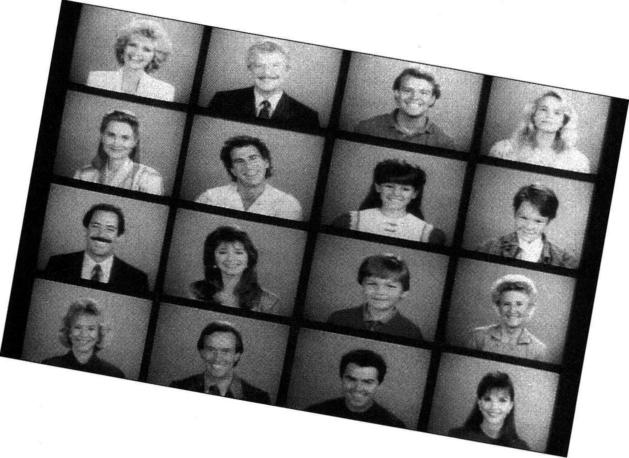Growing Up Brady: I Was a Teenage Greg, Special Collector's Edition (33 page)
Read Growing Up Brady: I Was a Teenage Greg, Special Collector's Edition Online
Authors: Barry Williams;Chris Kreski

"The Bradys," for all the good intentions and hard work, was shaping up to be a disaster. CBS knew it, Paramount knew it, and of
course we Bradys knew it too.
Too many Bradys.
(Courtesy Sherwood
Schwartz)

Then an even bigger disappointment occurred. In the midst of all
this turmoil, infighting, and dissatisfaction, the "Bradys" set became
an unhappy place. I mean, lord knows we'd done our share of lessthan-stellar television work, but through it all, the "Brady" soundstage was always one of the happiest in Hollywood. Now, though,
we were embarrassed by the series and exhausted from shooting it,
and the novelty of reuniting had worn thin. Our bodies were tired,
our nerves were shot, and the mood of the day turned sour.
The Bradys even started to fight among themselves. I'm not talking about knock-down-drag-outs, but by Brady-set standards, even a
verbal blowout was something simply unheard of ... until now.
Florence was first to crack, going head-to-head against a griping
Robert Reed. I didn't witness the altercation, but Lloyd Schwartz told
me about it: ' We were shooting a scene wherein Alice was supposed
to come into the room carrying a cake that's just loaded with lit candles. Now Bob, being of course the master of reality that he is, sighs
disgustedly and says, `Where would Alice light all these candles?' So I
just say, `I don't know-out there.' And Bob answers, `Well, one person couldn't possibly light all those candles alone.' Now Florence is
wonderful, but if you somehow manage to get her mad at you, she'll
let you have it big-time. And by now Bob is ranting and raving like, `I
cannot allow myself to participate in this implausible shit. I have
built my career as an actor upon drawing from reality.' That statement packs a double wallop for Florence, because it implies that he's
a great actor and she's a hack. Anyway, Florence turns to him, and hisses, `Well, maybe it's time you thought about getting a new
career.' And this happened in front of everybody. Bob ended up
storming off the set."
Strike three?
We were doomed. There isn't any argument about the fact that
we Bradys were the closest TV family in the history of television; and
now, thanks to our frustrating situation, we'd begun coming apart at
the seams. Even Ann B. Davis, the sweetest woman on the face of
the planet, wasn't immune-as Bob Reed found out one day on the
set. Bob was loudly parodying Mike Brady's lines, and as Ann
remembers it: "Alice was supposed to be doing a bit in Bobby's
wheelchair, and Bob decided to make fun of the script by adjusting
his originally scripted line to read, 'Gee, Alice, if this doesn't work
we'll be in deep shit."' Normally, Ann B. would've simply let Bob's
remark pass, but not now. This time, she shot back, "Well, I don't
know, Mr. Brady-how deep is your shit?"'
As the weeks passed, the situation got worse. By now, all of us were
aware of just how awful this series had become, but Bob Reed (who'd
gone from appalled to disgusted) took action. This time he bypassed
Sherwood, bypassed Paramount, and went straight to the top of the
totem pole by taking his gripes to the head honchos at CBS.
Right now, I can combine cliches by saying that Robert's rebellion
opened up a huge can of worms and might just have been the straw
that broke the Bradys' back. Here's his side of the story.
"I kept notes on the show, and used 'em in writing critiques, the
first of which was twelve pages long and basically said, `This sucks,
this sucks, this sucks.' And I sent 'em off to the network, as well as to
the front office and to Sherwood.
'Well, the lid blew off at Paramount, and they said, `How dare
you send this to the network!' And I replied, `They've got to knowmaybe they can help.' And the studio got used to that after a while,
but Sherwood never did. I had made a permanent enemy. And he'd
say, 'Come to me. Come to me if you have a problem,' so I did on
the first one.
'We'd go over my complaints item by item, and Sherwood would
interrupt and talk about saving Red Skelton's career or something
for forty-five minutes, and I1oyd would sit by his side, nodding, and
saying things like `Go with Dad. Just trust Dad.' So anyway, we'd talk
very nicely about it, but the changes we'd get back the next day in
the green pages [rewrites] were tiny, and about as useful as a BandAid at a train wreck. Apparently everything we'd talked about, someone else was hearing, because Sherwood certainly didn't hear any of
it. And after doing that for a while I thought, `Bullshit! Time to go to
the source, hammer at it, and see what we can do.' Well, that may
have helped to destroy the show. I don't know."
With or without Robert's assistance, CBS decided (probably wisely) that six episodes of "The Bradys" were enough, and America's
favorite family was laid to rest once more-perhaps this time for
good.
Actually, given the history and track record of the Bunch, we'll
probably resurrect ourselves again sooner or later, and show up in
something like Return from Beneath the Planet of the Bradys, Part 8:
"Sam the Butcher's Revenge." I asked Sherwood Schwartz what he
thought the future might hold for us Bradys, and after one of his
trademark ear-to-ear grins and a thoughtful pause, he told me this:
I don't know what's in store for the Bradys, but I do believe that
at some point in the future they may very well come back.
"I mean, I think there will always be a place for positive role models on TV, and there really aren't any to be found anymore.
Everywhere you look on television, parents are insulting kids, kids
are insulting parents, and they're all based in negativity. And I think
that's created a longing in viewers, even if it's a subconcious longing,
for characters who are nice to each other, and who get along with
each other, and who help each other, and who genuinely love each
other, instead of simply volleying insults back and forth for a cheap,
easy laugh."
I completely agree.

 obert Reed was one of the most private men I've ever
obert Reed was one of the most private men I've ever
met. He was a perfectionist who brought his professionalism to the set and left his private life at home. It is,
however, impossible to work so closely for so many
years with someone and not know a lot about who they are.
By the time "The Brady Bunch " was canceled, I had become
aware that Bob was gay, but didn't think much about it. Having
grown up in the business, I'd worked with many gay men and
women, and while I didn't particularly understand it, I certainly
didn't judge it. When it came to Bob, it wasn't an issue on our set. I
have since discussed the situation with the other kids and, for the
most part, they were either not aware that Bob was gay or never
gave it much thought. We all remember a warm, caring man, and
that is all that ever mattered to us.
It could not have been easy for Bob, being thought of as the
quintessential TV dad when his home life was so different. You
have to remember that we didn't have the openness in the '70s
that we have today. Admitting he was a homosexual back then
could have meant the end of the series and have been permanently damaging to his career. As a result, Bob protected his privacy
like Willie Wonka protected his recipe for Everlasting
Gobstoppers.
When we were filming our 1990 series, "The Bradys," Bob was
already in treatment for cancer and AIDS-related symptoms. We
didn't discuss his illness, but the signs were there. He never complained or let it interfere with his work, which was exactly Bob's
style. His illnesses, however, didn't keep him from being cantankerous and just as big a pain to Sherwood Schwartz as ever.
About a year after we wrapped "The Bradys," Bob called to tell
me (in his typical, understated way) that he had been diagnosed with cancer, but he didn't think it was a big deal. He said that he
knew he could beat it, but he wanted to make sure that I heard it
directly from him.
Early press
photo
(© Paramount)

'80s publicity
shot of Bob
(Courtesy of
Wendy
Winans)

The news immediately threw up a lot of red flags for me. For
openers, if Bob's illness truly wasn't a big deal, he never would
have mentioned it. Secondly, I had noticed the change in his
behavior on the set of "The Bradys" a few months back, which suggested that something was very wrong. He seemed to be moving
slower. Also, his life interests and priorities had changed. Bob
talked about selling his California home and cars so he could
spend, as he put it, "the rest of my days in New York." In sharp
contrast to his usual, aggressive, "Where's my next role?" attitude,
he took a job teaching Shakespeare at UCLA and spent his free
time practicing the piano.
